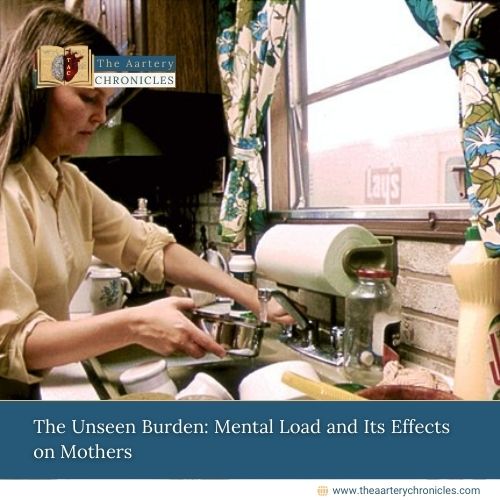

The Unseen Burden: Mental Load and Its Effects on Mothers
Introduction
In most discussions about household labour, the focus tends to be on the visible, physical tasks—cleaning, cooking, laundry, and childcare. These chores are often divided, albeit unevenly, between partners, with women typically bearing the brunt. However, there is a more insidious, frequently overlooked aspect of household labour that has a profound impact on women’s mental health: “the mental load“.
This invisible burden involves the cognitive effort required to anticipate needs, plan, organize, and manage the myriad tasks that keep a household running smoothly.
- While the physical division of labour may be unequal, it pales compared to the disparity in cognitive labour, where women are overwhelmingly responsible.
- The effects of this imbalance are not just frustrating but also detrimental, contributing to stress, depression, burnout, and strained relationships.
Overlooked Mental Load of Housework
When considering housework, it’s common to think about physical tasks like washing dishes, running errands, or cooking. It’s widely recognized that mothers are frequently expected to handle most of these activities. However, there’s an often-overlooked aspect of household labour: the cognitive load involved in anticipating needs, planning, organizing, and delegating tasks. For instance, someone must remember to replenish dish soap and decide which vegetables to prepare.
The Study: Uneven Distribution of Mental Load
Recent research has revealed that this cognitive dimension, referred to as the “mental load,” is distributed even more unevenly between partners than the physical tasks. This imbalance appears to have a significant mental health impact on women. A study published in the Archives of Women’s Mental Health found that mothers who shoulder a disproportionate share of cognitive household labour report higher levels of depression, stress, relationship dissatisfaction, and burnout.
Overview of the Study
A study by researchers at the University of Southern California surveyed 322 mothers of young children about their roles in managing household tasks. The study differentiated between physical labour (the actual execution of tasks) and cognitive labour (the mental work involved in managing these tasks).
In a recent study, experts surveyed 322 mothers with young children to examine the division of household responsibilities. Researchers collaborated with the creators of the Fair Play system, a tool designed to accurately measure household labour. This system categorizes tasks into cognitive dimensions (such as anticipating, planning, and delegating) and physical dimensions (hands-on execution). The study then analyzed how these tasks are distributed between partners.

The Findings of the Study
The findings revealed a significant gender disparity:
- Mothers not only performed more physical housework but also took on a much larger share of cognitive labour compared to their partners.
- On average, mothers were responsible for approximately 73% of cognitive tasks and 64% of physical tasks, while their partners handled 27% and 36% respectively.
For every task examined, the gender gap was larger in cognitive labor than in physical execution.
The only exception was taking out the garbage, where fathers engaged more in planning and execution. Fathers also performed more home maintenance tasks, but mothers handled the majority of the associated planning.
Deeper Impact of Cognitive Labor Imbalance on Women's Well-Being
Interestingly, while an unequal division of physical tasks was linked to poorer relationship quality, it was the imbalance in cognitive labour that had a more profound impact on women’s psychological well-being.”
The Invisible Burden: How Cognitive Labor Disparities Are Impacting Mothers' Mental Health
Household chores are often perceived as physical tasks like washing dishes, doing laundry, or cooking dinner. However, a significant and frequently overlooked aspect of household work is “cognitive labor”—the mental effort required to anticipate needs, plan, organize, and delegate tasks within the home. Recent research highlights that this cognitive dimension is disproportionately managed by mothers, with profound impacts on their mental health.
This unequal distribution of cognitive labor is deeply rooted in patriarchal norms, which have historically assigned women the role of primary caregivers and household managers. These outdated gender roles perpetuate the expectation that mothers should naturally take on the invisible mental burden of running a household, while their partners remain largely uninvolved in this aspect of family life. As a result, women bear a disproportionate share of the stress and mental strain.
The Implications
This unequal distribution of cognitive labour exacerbates
- Stress
- Depression
- Relationship dissatisfaction
Unlike physical tasks, cognitive labour is often invisible and goes unrecognized, increasing its psychological toll. The constant need to track household needs diverts individuals from other priorities and can lead to significant burnout.
The implications extend beyond individual households.
- The unequal division of cognitive labor is a driver of gender inequality, hindering full participation in the workforce and perpetuating traditional gender roles.
- It reinforces the expectation that one partner is primarily responsible for managing the home, a burden that is not equally shared.
- This mental load contributes to higher rates of mental health issues, including stress and depression.
The invisible nature of this labour makes it particularly taxing, leading to feelings of frustration and isolation for those who carry the load.
Conclusion
The prolonged and disproportionate cognitive load that many mothers experience can lead to severe long-term health consequences. Domestic work encompasses a range of activities, including housework and caregiving, that are often seen as low-value and are invisible in mainstream economics. This work is not only time-consuming but also physically and emotionally draining, leading to significant mental health burdens for women. Addressing the imbalance in cognitive labor is not just about fairness; it’s about safeguarding the mental health and well-being of women who carry this unseen burden. Recognizing and sharing cognitive labor more equitably is essential for fostering healthier relationships, reducing stress, and promoting a more just and balanced society.

Abhigyan Barooah
Reviewed by Dr. Aarti Nehra








